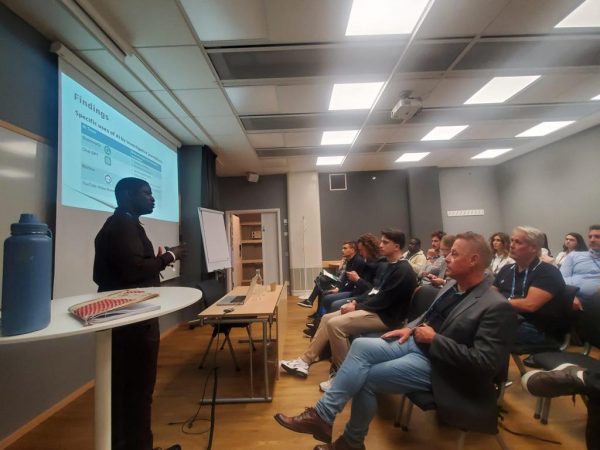Richard Mensah Adonu, a graduate student in journalism and mass communication, spoke at the 2023 Global Investigative Journalism Network (GIJN) Conference in Gothenburg, Sweden, last September.
Adonu presented his academic paper “Investigative Journalism in The New Age: Examining the Use of AI Tools in Investigative Journalism Practices in Ghana,” which was co-authored with Albert Junior Nyarko from Washington State University, Redeemer Buatsi from the University of Louisiana at Lafayette and Michael Sataaviel Yerb Jr. from Liverpool John Moores University.
The presentation explored the artificial intelligence tools that journalists in Ghana are using to aid in their investigative work, flag false information and debunk false claims. The study also identified challenges that exist in using AI-enhanced applications among the selected journalists.
Adonu, who recognized his research potential and interest to conduct research on artificial intelligence and its roles and impact in journalism, said, “Presenting my research on AI and investigative journalism in Sweden was a huge accomplishment and a milestone.”
Sharing the events that led to securing a slot to present in Sweden, Adonu said that it all started with a late-night find on X (formerly known as Twitter). He was scrolling social media in late March when he saw the call for abstracts from the GIJN.
“Surprisingly, the deadline for submission was the next day,” Adonu said. “But the good news was that I had colleagues from other universities, so we worked well together to quickly write an outstanding abstract on a chosen theme and submit it before the deadline.”
“However, the true magic began when our abstract was approved, and we were instructed to submit a complete paper by June 30. It was a qualitative study, so we conducted interviews via phone to develop the paper and got it submitted before the deadline, which subsequently got approved for presentation in the exciting city of Gothenburg, Sweden.”
On his experience presenting his research, Adonu said, “I must acknowledge that this was a global conference and as well as my first time presenting an academic paper to over 30 audience members, so it was a bit scary but refreshing.”

Adonu also said he got the opportunity to co-present with Nausheen Husain, a professor from Syracuse University (USA), who presented her paper “Beyond Datawrapper: What Nontraditional Data Visualizations in Award-winning Journalism Tell Us About Data Education.”
Beyond the stage, Adonu got to network and build connections with other professionals, professors and students.
“In all, the conference was fun, and I had a lot of questions and suggestions to replicate this current study in other countries to enable me to create lists of AI-enhanced tools used globally in other newsrooms,” he said.
Adonu also thanked Kelly Winfrey, Greenlee director of graduate education and associate professor, and the rest of the graduate committee members for supporting him in attending the conference.
The GIJC is the world’s largest international gathering of investigative journalists. The conference features training on the latest tools and techniques, workshops, and networking and brainstorming sessions. By focusing on skills and training, it seeks to help spread state-of-the-art investigative reporting, data journalism, and cross-border collaboration around the world.
Each GIJC is co-hosted by a member organization of the Global Investigative Journalism Network (GIJN), an international hub for the world’s investigative reporters. The 2023 GIJC was co-hosted by the GIJN, Fojo Media Institute and Föreningen Grävande Journalister (the Swedish Association of Investigative Journalism).
GIJC 2023 saw a record number of practitioners, researcher and academicians come together to learn and present on diverse topics. Learn more about the GIJC 2023 speakers and presentations here.
